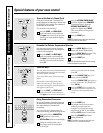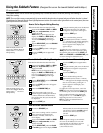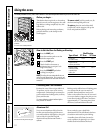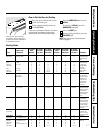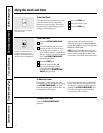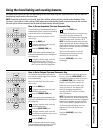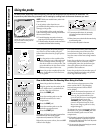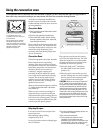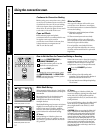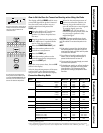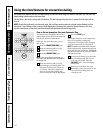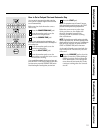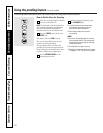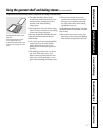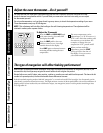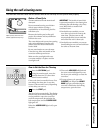
Safety InstructionsOperating InstructionsCare and CleaningTroubleshooting TipsCustomer Service
Using the convection oven.
Cookware for Convection Cooking
Before using your convection oven, check
to see if your cookware leaves room for air
circulation in the oven. If you are baking
with several pans, leave space between
them. Also, be sure the pans do not touch
each other or the walls of the oven.
Paper and Plastic
Heat-resistant paper and plastic
containers that are recommended for use
in regular ovens can be used in
convection ovens. Plastic cookware that
is heat-resistant to temperatures of
400°F. can also be used.
Metal and Glass
Any type of cookware will work in your
convection oven. However, metal pans
heat the fastest and are recommended for
convection baking.
■
Darkened or matte-finished pans will bake
faster than shiny pans.
■
Glass or ceramic pans cook more slowly.
When baking cookies, you will get the
best results if you use a flat cookie sheet
instead of a pan with low sides.
For recipes like oven-baked chicken,
use a pan with low sides. Hot air cannot
circulate well around food in a pan with
high sides.
How to Set the Oven for Convection Baking or Roasting
Press the
CONVECTION BAKE
or
CONVECTION ROAST
pad.
Press the number pads to set the
desired oven temperature.
Press the
START
pad.
To change the oven temperature, press
the
CONVECTION BAKE
or
CONVECTION
ROAST
pad and then the number pads to
set the new temperature.
When the oven starts to heat the changing
temperature, starting at 100°F., will be
displayed. When the oven reaches the
temperature you set, 3 beeps will sound.
Press the
CLEAR/OFF
pad when
finished.
NOTE:
■
You will hear a fan while cooking with
convection. The fan will stop when the door is
opened but the heat will not turn off.
■
You may hear the oven clicking during baking.
This is normal.
Multi-Shelf Baking
When convection baking with only 1 shelf, follow
the shelf positions recommended in the Using the
oven section.
Because heated air is circulated evenly
throughout the oven, foods can be
baked with excellent results using
multiple shelves.
Multi-shelf baking may increase cook times
slightly for some foods but the overall
result is time saved. Cookies, muffins,
biscuits, and other quickbreads give very
good results with multi-shelf baking.
30” Ovens
When baking on 3 shelves, place one
shelf in the bottom (A) position, one on
the third (C) position and one in the 5th
(E) position.
27” Ovens
When baking on 3 shelves, divide the
oven into thirds by placing the offset shelf
in the third (C) shelf position and the
straight shelves in first (A) and fourth (D)
shelf positions.
For two-shelf baking, place the offset shelf
in the bottom (A) shelf position. Place
the straight shelf in the third (C) shelf
position.
CAUTION: When you are using the offset shelf
(on 27” models) in the lowest position (A), you
will need to use caution when pulling the shelf
out. We recommend that you pull the shelf out
several inches and then, using two pot holders,
pull the shelf out by holding the sides of it. The
offset shelf is low and you could be burned if you
place your hand in the middle of the shelf and
pull all the way out. Be very careful not to burn
your hand on the door when using a shelf in the
lowest position (A).
Multi-shelf position 30
″
oven
Multi-shelf position 27
″
oven
16
or



